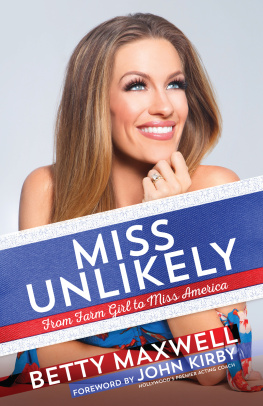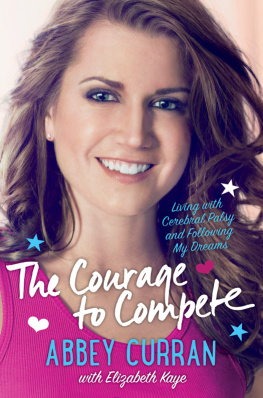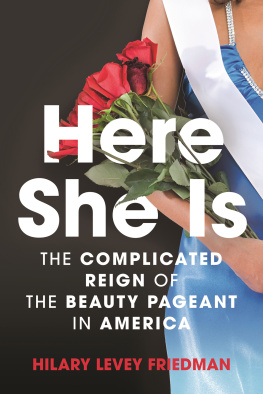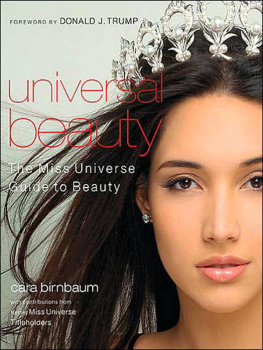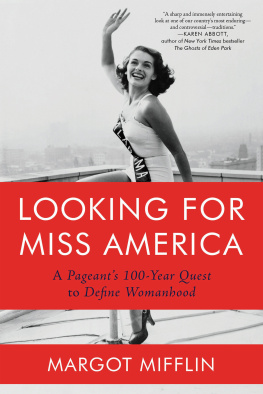
Mark Crispin Miller, Series Editor
This series begins with a startling premisethat even now, more than two hundred years since its founding, America remains a largely undiscovered country with much of its amazing story yet to be told. In these books, some of Americas foremost historians and cultural critics bring to light episodes in our nations history that have never been explored. They offer fresh takes on events and people we thought we knew well and draw unexpected connections that deepen our understanding of our national character.
BEING MISS AMERICA
BEHIND THE RHINESTONE CURTAIN
Kate Shindle

University of Texas Press
AUSTIN
Copyright 2014 by Kate Shindle
All rights reserved
First edition, 2014
Requests for permission to reproduce material from this work should be sent to:
Permissions
University of Texas Press
P.O. Box 7819
Austin, TX 78713-7819
http://utpress.utexas.edu/index.php/rp-form
Cataloging data is available upon request from the Library of Congress.
Library of Congress Control Number: 2014936789
ISBN 978-0-292-73921-5 (cloth : alk. paper)
ISBN 978-0-292-73922-2 (library e-book)
ISBN 978-0-292-76729-4 (individual e-book)
doi:10.7560/739215
To the millions of people who change the world every day, without the recognition or power of the Miss America crown.
To my family, for impressing upon me the magic of Miss America and supporting me as I chased that goalespecially my dad, Gordon Shindle, the most ethical person I know.
And to all the volunteers who unselfishly make Miss America happen, particularly Fran Skinner-Lewis, who introduced me to myself and continues to show me that the world is so much bigger than I think it is.
CONTENTS
PROLOGUE
When people hear that I was Miss America, their first question is almost always the same.
What was that like?
The sentence doesnt always come out the same way, of course. Those who are awed by itwho grew up knowing Miss America as annual destination television on the second Saturday in Septemberalmost always emphasize the last word. What was that like? they ask, their eyes gleaming with wistfulness and excitement and a little bit of envy. To them, you are royalty in disguise, whether youre at a black-tie event or in the locker room at your gym. The very idea that you may have been masquerading as a normal civilian is baffling; to them, Miss America is something that should be worn on ones sleeve. It is the ultimate of ultimate achievements.
And then theres the other camp. The camp that makes a predictable set of assumptions about you as soon as they hear that phrase. Miss America. Before you even open your mouth, theyve pegged you as some kind of inferior beingvain, airheaded, or worse; the kind of smart girl who has become a sellout and traded on her looks instead of working her way up the ladder like everyone else. And in that case, the emphasis changes and is accompanied by a knowing little sneer: What was that like?
There is a third group. It is very, very small. Its made up of a few people who have been around the pageant for a long time, a handful of journalists (Frank Deford comes to mind), one or two very smart publicists, about half of the former Miss Americas, and a few dozen of their closest friends and family members. And then, occasionally, if you spend enough time as an exMiss America, you run into extra, random members of this third group.
These are the ones who just ask you the question with no dramatic emphasis on any particular word. When they lean in and ask, What was that like? its because they really want to know. Because they recognize that along with being one of the nations oldest not-for-profit institutions, Miss America is among our most complex. They have watched, sometimes peripherally, as this tradition has white-knuckled its way down the cultural ladder, rung by rung by painful rung. They may have a certain amount of reverence for the crown, but not so much that they cant see it with clear and pragmatic eyes. And they are curious as to how it must feel to be a thinking person living inside the mythology of Miss America.
It is the third groupthose I have met and, especially, those I have notfor whom I primarily write this book.
Part One
FLAPPERS AND SCHOLARS AND CROWNS, OH MY!
ONE
It doesnt hit me for almost a month after I win that I am, in fact, Miss America.
When I was a kid, I was a pretty good student. A little prone to procrastination, perhaps, but good nonetheless. Apparently I grew up with undiagnosed ADHD, which might explain why I had problems focusing on thingshomework, cleaning my dresser drawersunless I was faced with pressing and non-negotiable deadlines. But damn, could I write a great essay the night before it was due.
Like all kids, though, I didnt always do things right. Occasionally, a punitive writing exercise found its way onto my to-do list, the kind intended to drill your priorities into your head by way of your aching fingers. The kind that makes kids shudder with boredom before they even pick up the pen. More than anything, it takes an exercise like this to get me to digest that Ive actually won the crown.
I am in a hotel room, like I suddenly always am. This one is in Washington, DC, mere weeks after the acquisition of my sparkly new hat. And just as I did years ago in school, I have an assignment. This time I have to write Kate Shindle, Miss America 1998. Six hundred times. On eight-by-ten glossy color pictures of my own head.
Signing autographs, as it happens, is already my least favorite part of the gig. This particular batch, on this particular day, is for the people back home. My adopted home, that is, near the Chicago suburbs where Ive just finished my junior year at Northwestern University. Every year, the new Miss America has a homecoming in the state shes represented at the big event. The director of the Miss Illinois Pageant (of whom Ive spent the past three months completely terrified, but who will eventually become a best friend/big sister/surrogate mom) has by far the smartest marketing mind Ive ever come across. She actually gets the city of Oakbrook Terrace, a largely corporate suburb looking to heighten its visibility, to pony up something like $100,000 a year for the honor of hosting the Miss Illinois Pageant. Its brilliantmuch of the country is struggling to hang on to sponsors and donors and scholarships, and Fran has cracked the code of how to pitch the whole damn thing in a cash-generating way.
The downside for me, at the moment, is that everyone who has rallied or provided support for the state pageant is foaming at the mouth with excitement that Miss Illinois has brought home the national crown. And what do they want? An autographed picture. For the really big contributors, these will be made into plaques, and I will personally be on hand to present them. Kate Shindle, Miss America 1998. Kate Shindle, Miss America 1998. For Cynthia, the trainer who spent dozens of unpaid hours whipping my ass into shape and schooling me on the virtues of slow-cooked oatmeal. Kate Shindle, Miss America 1998. For Karen, who taught me the fine cosmetic line between stage face and drag queen. Kate Shindle, Miss America 1998. For Linda, who traveled all over the state with me and tried not to laugh while I agonized over what fraction of a PowerBar would give me just enough energy to get through my second workout of the day. For Curtis, who orchestrated my music for the talent competition, and Dominic, who staged it. Kate Shindle, Miss America 1998. For Robin, who donated and/or created thousands of dollars worth of wardrobe for just about every phase of competition. For the mayor of Oakbrook Terrace. For the people who own the Drury Lane Theatre. For Costas Greek Restaurant, which provides food for Miss Illinois Week. For the president of Northwestern University. For Kurt, my voice teacher. For Joel, who made a valiant (and nearly successful) effort to teach me how to put my hair up with little pieces carelessly tendrilling their way out. Kate Shindle, Miss America 1998. For Chuck, the Chicago Bulls executive who snagged me a pair of Michael Jordans championship-series sneakers to wear in the Miss America Boardwalk Parade, where the fans scream Show us your shoes! and every contestant wants hers to be the coolest. To the Miss Illinois judges, who told me on the night they selected me that they thought I might sneak in there in Atlantic City. To Carol and Ken and Jackie and Marjorie and Sandy and Chip and Kelli and... I start to lose track of all the people who practiced interview skills with me, encouraged me, helped me to pack my thirteen suitcases, in which every single item had to be labeled Illinois, atcharacteristicallythe very, very last minute. If I were to look at the video of the night I won the pageant, I would see myself joyfully waving to them as I spot them in the Convention Hall audience. Yeah, yeah. Waving is easy. Especially when you cant quite feel your body. Signing six hundred pictures is work. Kate Shindle, Miss America 1998. Kate Shindle, Miss America 1998
Next page


